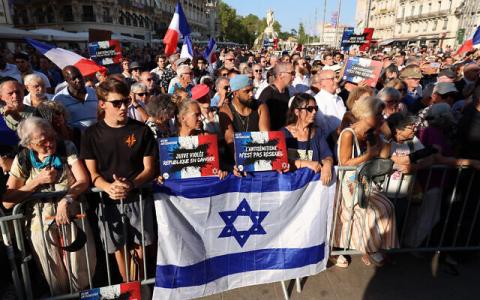EU issues declaration against antisemitism
The Council Declaration on fostering Jewish life and combating antisemitism acknowledged the presence of antisemitism in Europe over centuries, “culminating in the Holocaust,” and noted its contemporary resurgence among the “radical and fringe groups espousing right-wing, left-wing, or Islamist extremism.”
The phenomenon, the EU said, often hides “behind anti-Zionism, but it can also be found in the center of society” and takes the form of “holding Jews collectively responsible for the actions of the State of Israel or for example by spreading antisemitic hatred, disinformation, and terrorist content online through algorithms.”
The EU especially expressed regret about the rise of antisemitic incidents and hate crimes following Hamas’s unprecedented October 7 attack, in which some 1,200 people, mostly civilians, were murdered and 251 were taken hostage.
Antisemitism, the declaration continued, violates fundamental rights, and “radicalization and violent extremism endanger not only the Jewish people but erodes European democracy and security and the values on which the EU is founded.”
As such, the EU said it deemed it crucial to “step up action to actively prevent and combat it in all its forms and to ensure Jewish life continues to thrive in an inclusive and diverse EU.”
The declaration called for consequences for people who spread “antisemitic hate speech, including Holocaust denial, trivialization, and distortion” both online and offline. Member states should prosecute “illegal hate speech and terrorist content,” and “large online platforms and search engines should identify and adequately mitigate risks related to the dissemination of illegal content,” the declaration said.
It added that it was important to foster Holocaust education and research and that it was essential for Holocaust victims to be honored and survivors to live in dignity.
The EU also underscored the importance of Jewish people expressing their identities and said it remained “committed to fostering Jewish life in order for Jewish people to prosper and remain an inherent part of Europe now and in the future.”
In terms of safety and security for Jewish Europeans, the EU said member states should “give priority to ensuring” that all people, particularly Jewish people, be safe to practice their religious beliefs and that judicial institutions should be “adequately equipped and trained to recognize and take action against such hate crimes.”
Jewish organizations praised the declaration on Tuesday.
The World Jewish Congress released a statement welcoming the declaration and said it had worked closely with the EU to help adopt a “strong and comprehensive Council declaration.”
“The adoption of this declaration by the Council of the European Union is a powerful and necessary statement of intent, and I commend this demonstration of unwavering commitment to combating antisemitism and safeguarding Jewish communities,” said WJC President Ronald Lauder.
“This declaration reflects a clear understanding by all EU member-states that combating antisemitism requires serious, coordinated action. This urgency has only intensified following the horrific terrorist attacks of October 7th, which have triggered a dangerous surge of antisemitism across Europe and beyond.”
The European Jewish Congress echoed this sentiment, saying it was satisfied that “the rise of antisemitism related to Israel, increasingly affecting European Jews, has been recognized by EU member states in the declaration.”
“The declaration reaffirms the urgency to fight against antisemitism in Europe amid its unprecedented rise after the worst massacre against the Jewish people since the Holocaust. It is essential that European leaders unite in this fight. We must ensure that Jewish communities can thrive in safety and dignity,” said EJC President Dr. Ariel Muzicant.
Antisemitism has spiked massively around the world over the past year since Hamas’s October 7 attack and throughout Israel’s war with the terrorist organization in Gaza.
In a poll released in July, 96 percent of Jewish respondents from 13 EU nations said they experienced antisemitism in daily life with more than half saying they were concerned for their or their families’ safety.
Following extreme increases in antisemitic cases worldwide, including in European nations, the UN last month held a workshop led by European and US antisemitism envoys focused on how to deal with the surge.

